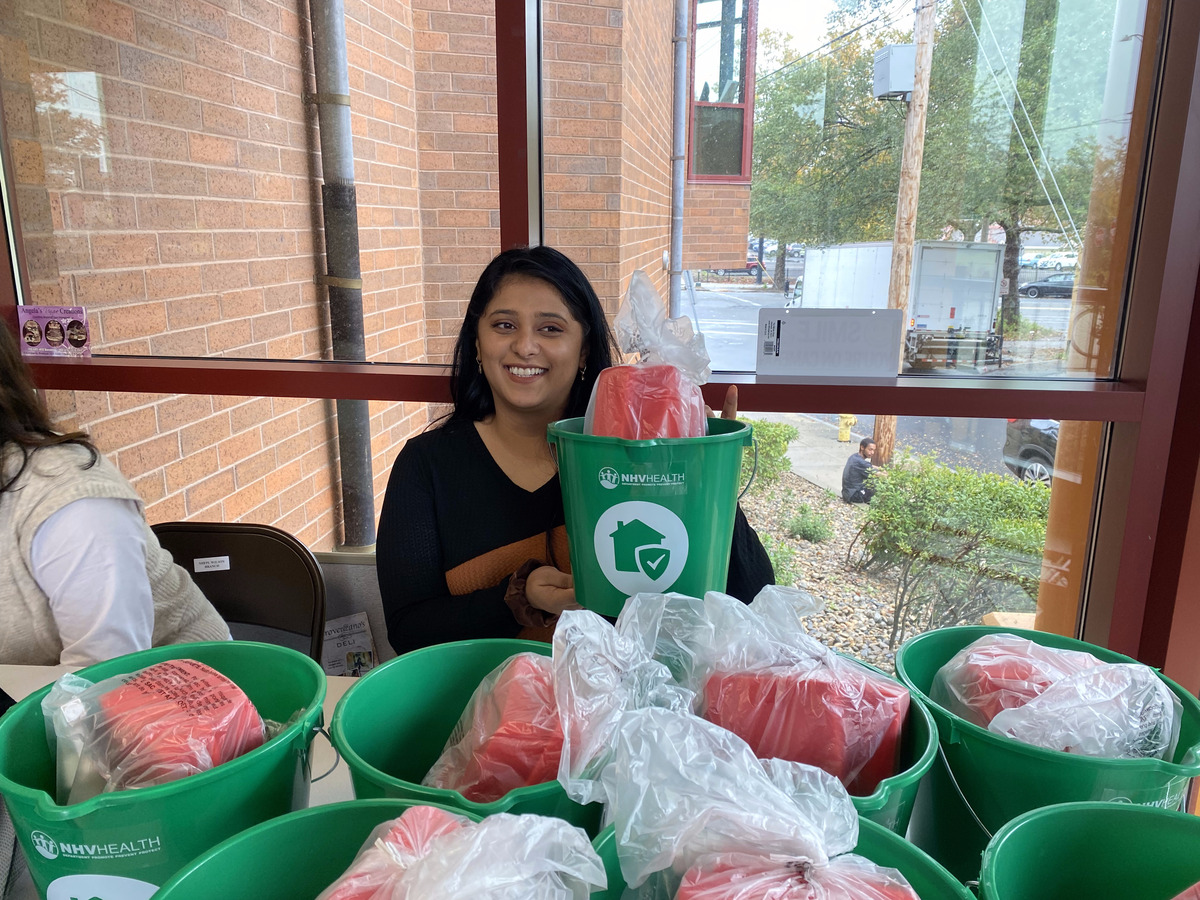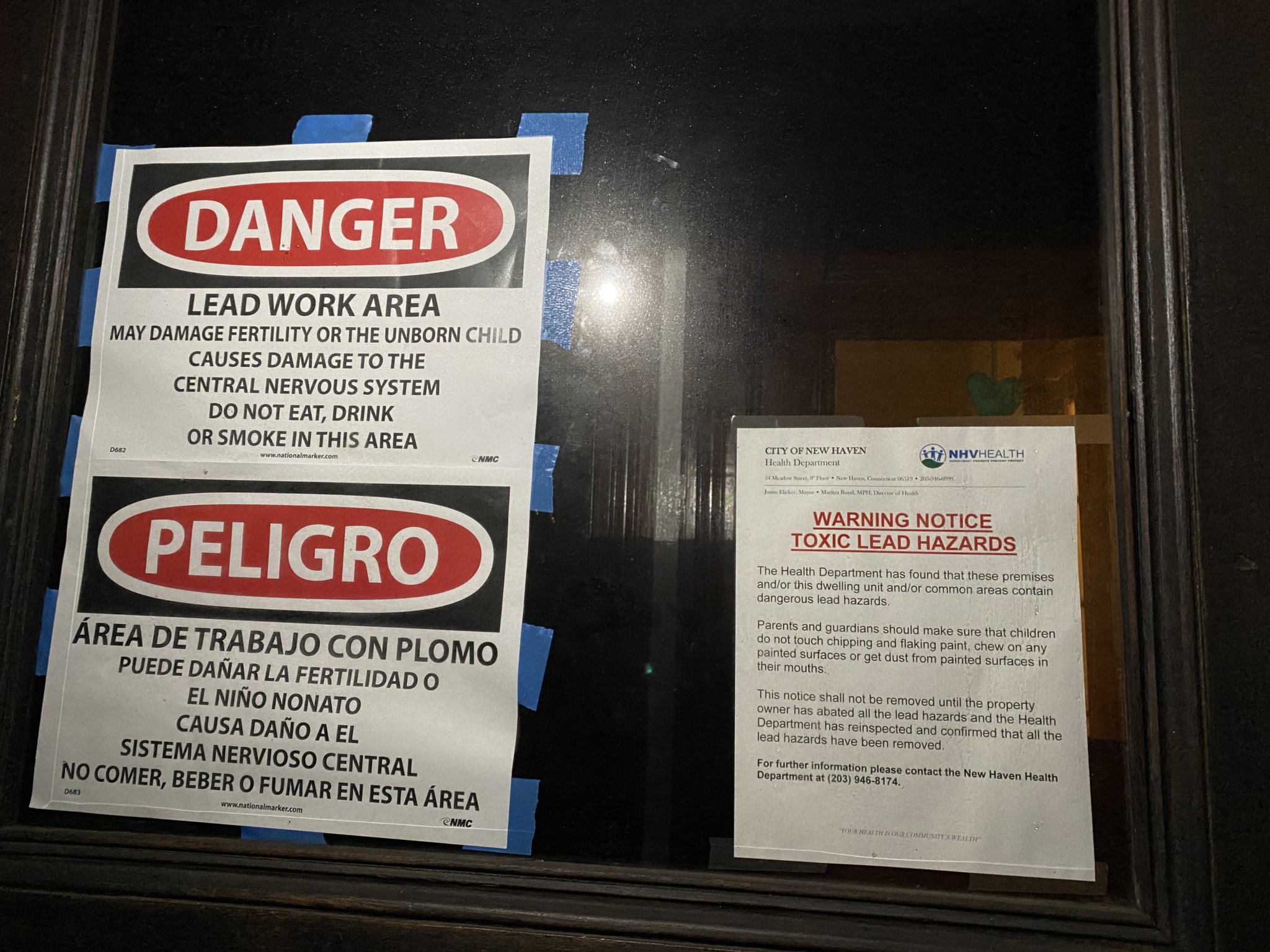New Haven launches outreach efforts for National Lead Poisoning Prevention Week
The city’s lead program includes housing inspections, loans for renovations and free certifications for contractors.

Sadie Bograd, Contributing Photographer
Lead is a poisonous substance that can cause brain damage, learning disabilities and developmental problems. It’s also in 85 percent of New Haven homes.
New Haven has adopted a more aggressive lead program in recent years with resident advocacy recently motivating changes in the city’s lead ordinance. Last Thursday, to mark the start of National Lead Poisoning Prevention Week, Mayor Justin Elicker announced the launch of a new online dashboard that tracks lead inspection and abatement cases. The health department is also conducting outreach events across the city to inform residents about ways to prevent lead exposure and access funding for lead abatement projects.
“Lead paint… has caused and will continue to cause exposure in children, which can lead to long-term impacts on development, from health to mental health to developmental issues,” Mehul Dalal, New Haven community services administrator, told the News. “One of the things that we’re trying to do and promote is that we do have resources to help families, specifically families that are in low-income neighborhoods that may be at highest risk.”
Most of New Haven’s homes were built before 1978, when lead paint was banned for residential use. When the paint chips, those living in the home often come into contact with lead via dust and soil. This can cause severe health problems, especially for young children.
According to Rafael Ramos, director of environmental health for the New Haven Health Department, 5.4 percent of New Haven children under the age of six have elevated blood lead levels compared to 1.7 percent statewide.
Dalal noted during the press conference that lead exposure disproportionately affects low-income children living in older and sometimes poorly-maintained homes.

Residents can take steps on their own to minimize the risk of lead exposure.
This week, the health department is distributing cleaning kits with buckets, sponges, spray bottles, rags and gloves so that families can contain lead dust around window sills, door jams and other “friction areas.” Ramos wrote that this strategy of wet cleaning is much more effective than sweeping or vacuuming, which can spread lead dust. However, Zarqa Ansari, project manager of the health department’s lead program, noted that these measures are just “interim controls,” not full lead abatement procedures.
In response to this elevated risk, New Haven has expanded its lead response program. Under Connecticut law, children must have two blood lead level tests before their third birthday. Blood levels above 5 mcg/dL trigger the New Haven Health Department’s involvement, in contrast to the statewide intervention threshold of 20 mcg/dL, which will be lowered next year.
When a child’s blood levels are elevated, the city’s health department provides families with educational materials, completes an epidemiological questionnaire and conducts a lead inspection.
The certified contractors create and implement abatement plans to mitigate lead exposure in coordination with property owners. Residents are usually able to remain in their homes during abatement. Since 2019, only 21 temporary relocations have taken place.
Using funds from the U.S. Department of Housing and Urban Development, the city offers forgivable loans of up to $15,000 to low-income property owners for lead abatement projects. Ansari said that landlords have been eager to get involved with the program.
“It’s mostly small landlords that have one or two properties that can’t afford to abate their unit, because the cost of lead abatement has gone up about 30 percent in the last two years,” Ansari said. “Now that we are promoting the program, we’re getting a lot of calls from landlords that are volunteering. So instead of us waiting for a kid to get lead poisoned, now we’re having landlords volunteer and participate in the program.”
Despite this interest, the city is also facing a shortage of qualified contractors. Ramos wrote in an email to the News that there are currently nine certified contractors who can bid to take on lead abatement projects. In response, the city is offering a range of free and subsidized lead abatement trainings in English and Spanish starting Oct. 31.
Ansari said the department is focusing outreach in the city’s low-income neighborhoods designated as opportunity zones, including the Hill and Fair Haven.
“I like doing outreach, communicating and getting out into the community, helping out as much as you can, because a lot of people don’t know about these resources,” lead community worker Chelsea Wearing said.
Joseph Deleon, a resident who stopped by the health department’s table at Wilson Library in the Hill on Wednesday, said he was planning to give the department a call and request an inspection, since he lives in an “older house” and has young nieces and nephews.
In addition, the department has launched a new public dashboard which displays what stage cases are at in the abatement process. According to the dashboard, 396 blood lead cases have been opened since 2019. 243 of those are closed, 75 are open and 78 are pending updates.
Of those open cases, 61 were started in 2022. As of Oct. 27, the majority of those cases are waiting on the creation of a management plan or the start of abatement work, with 13 cases still waiting for an initial lead inspection or lab results.
Ramos wrote that the dashboard “serves to increase transparency and accountability.”
It also reveals some of the major barriers that the health department has run into in their lead poisoning investigation efforts. Under the department’s timeline, epidemiological questionnaires should be completed within 30 working days after a case is opened. Of the 89 cases with late epidemiological questionnaires, nearly half were attributed to parents being unreachable.
Ramos wrote that the health department created a door knocker to leave with families “to alert parents that we are trying to contact them.” He added that although some cases may be behind schedule, they will not be closed until abatement is achieved.
113 cases — nearly 30 percent of all cases since 2019 — did not have an inspection completed after the target of 30 days. The main reasons listed by the dashboard were COVID-19 restrictions and parents rescheduling or being unavailable for the initial inspection date.
“COVID, that’s been a major obstacle for us,” Ansari said. “Because of COVID, a lot of people still wouldn’t allow our inspectors into their homes.”
City officials took Lead Poisoning Prevention Week as an opportunity to call on the state and federal government for additional investment.
Dalal told the News that lead poisoning is connected to other housing issues.
“We need to make it easier for folks who are in poor-quality housing, if they don’t have the means to move to better quality housing, to provide them with some support,” Dalal said.
He suggested the expansion of housing voucher programs as one policy intervention that could improve people’s ability to move into better housing and thereby reduce the risk of lead exposure.
The New Haven Health Department will be conducting outreach at three grocery stores on Friday.







